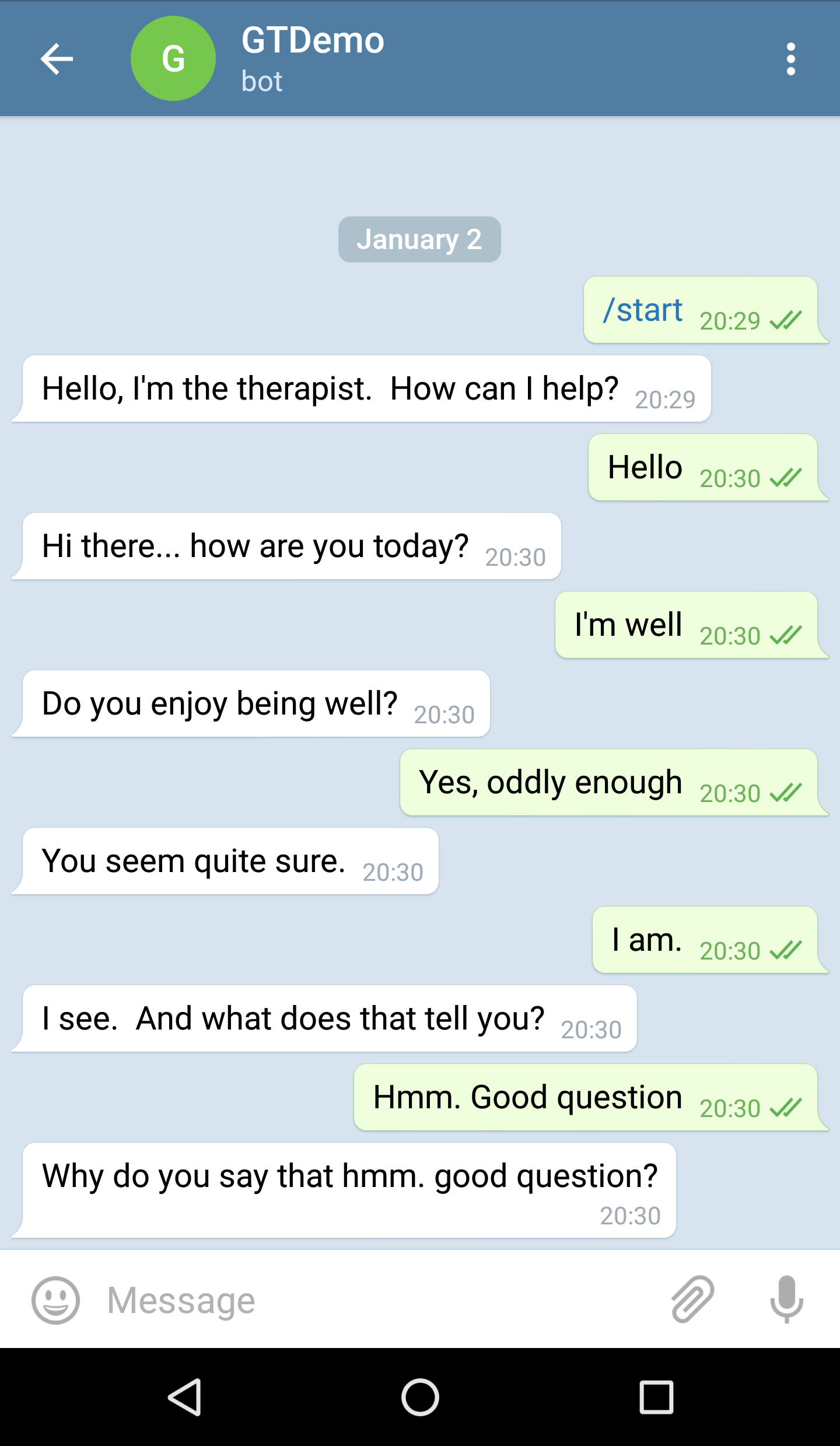Building a simple Telegram bot using PythonAnywhere
Jan 2, 2017
by giles
Update 2024-06-20: it should work on free accounts again!
On 2020-01-12 we updated the original post with the following comment:
For some reason Telegram has stopped accepting wildcard HTTPS
certificates for bots, so unfortunately this tutorial will no longer
work on a PythonAnywhere free account. For the webhooks part of the
tutorial to work, you will have to get a paying account with a
custom domain. Thanks to fivechar for letting us know in the
comments.
On 2024-06-18 user FizzFanatic posted on our forums that webhook
solution is working on free accounts – and it looks like it is,
thanks!
Original post
There’s an explosion of chat apps and bots at the moment, and it’s
easy to see why. They’re a useful new way of interacting with
computer systems, they’re interesting to code, and they’re
actually surprisingly easy to create.
This blog post shows how you can get a simple bot up and running,
using Telegram. Telegram isn’t as popular
a messaging platform as WhatsApp or Skype, but it’s much easier to
build bots for. You’ll need a normal computer and also a phone on which
you can install the Telegram app. When you’ve finished working through
the steps here, you’ll have a bot that can have an almost-plausible
conversation with you.

It uses PythonAnywhere, which probably isn’t very surprising given
the name of this blog ;-) You can do everything in here using
a free PythonAnywhere account, and the bot you wind up with will
be fully-functional. You’ll only need a paid-for account if your
bot starts getting lots of users – of the order of thousands of
messages a day.
So, without further ado, let’s get started!
Read more…
The PythonAnywhere Newsletter, December 2016
Dec 22, 2016
by harry
Welcome to our Christmas newsletter! Featuring a selection of the Internet’s very worst Christmas-themed animated Gifs!

Here’s what we’ve been up to.
Read more…
System update this morning -- why it took so long
Dec 14, 2016
by giles
This morning we deployed a new version of PythonAnywhere – we’ve blogged about the new
stuff that you can see in it, and this post is a run-down on why it took longer than we
were expecting.
Our normal system updates tend to take between 15 and 20 minutes. Today’s was meant to
take about 40 minutes – more about why later – but it wound up taking over an hour and
forty minutes. That definitely warrants an explanation.
Read more…
New release, ft. 2016-style Javascript and the Deep Tarpit.
Dec 14, 2016
by harry
The main driver for our release this morning was a move, behind the scenes, to
put our servers into a “VPC”, and despite the fact that it’ll have no visible
impact, it was a significant change to the infrastructure, and not without its
challenges, as you’ll hear in more detail from Giles later :)
One Yak, Fully Shaved.

One change you might notice is that the Consoles page has changed, and includes some little red Xs for killing consoles. The original idea was just to change them from being links that cause a page refresh to being ajax calls, which would let you kill multiple consoles at the same time. Somehow though, that small user interface tweak turned into the whole office deciding to treat that How it feels to learn JavaScript in 2016 comedy blog post as if it were an instruction manual, and we have now spent several days knee deep in React, ES6, promises, webpack, npm, Enzyme, fetch, promises, promises, and many, many more. Still, by the end of it, it all worked, and we have to conclude that ES6 is much nicer to work with than horrible old javascript.
The Deep Tarpit
The tarpit is one of the key ways we balance the resource needs of our various users. What happens when you exceed your CPU quota is that your processes still run, but they get a lower priority compared to people who are still within the amount they paid for. That’s been working fairly well, but as with all things, we notice there’s a power law at work, and there are a small number of users who regularly go massively over their tarpit limit. We’ve added some code that will automatically kill processes of these kinds of users, and send them a friendly notification email. Bad programmer! No biscuit.
We’ve also added some code to limit the amount of output in consoles, so that kids (and adults) whose first Python program is while True: print(“farts”) will have less of an impact on the system. Although plenty of farts will still be printed, fear ye not.
The upshot of all that should be that console performance will hopefully be a little more consistent from now on.
Better support for non-English keyboards
We do our best to avoid the classic Anglocentric, parochial laziness of imagining that the world ends with ASCII, but it takes work! For a while we’ve known that users on certain operating systems with certain keyboard types & layouts would have difficulties entering certain text into our consoles. So we’ve rolled out the ability to switch from hterm to xterm.js for our client-side terminal emulation.
If you’d like to try it out, give us a shout and we can switch it on for you. NB - keyboard shortcuts for copy + paste will be different, it’ll be Ctrl+Ins / Shift+Ins instead of Ctrl-C & Ctrl-V.
General bugfixes and security fixes
And the usual retinue of bug fixes. Some of which were (minor) security fixes, incidentally, as reported by some enthusiastic security researchers. Find out more about our bug bounty if that describes you!
The PythonAnywhere newsletter, November 2016: Two-factor auth and a new system image
Nov 29, 2016
by harry
We try to get a newsletter out every month, but sometimes we just get too
distracted working on our latest and greatest features to manage it. It wasn’t
that we were all out in Norway doing an opera, honest :-)
Here’s what we were up to.
Read more…
Today's upgrade: improving websites, better security
Oct 13, 2016
by giles
This morning’s system update went smoothly, and we’ve made a couple of great changes :-)
Improved website routing
This one should be pretty much transparent to you, but we’ve revamped the way we route requests for the websites that we host; this should speed things up for some people.
Noisy neighbours always cause problems, in the real world and on the Internet. When someone writes a website that hogs system resources on PythonAnywhere, sometimes it can impact other people who happen to be on the same server. Naturally, we monitor the system, and when we find a particularly badly-behaved website we notify its owner by email and ask them to fix it – or in extreme cases, if it’s causing serious problems, we shut it down. But that’s far from ideal.
Today’s update makes that all a lot better. We’ve given ourselves, the system administrators, fine-grained control over where websites run. So now, if we see a website that’s causing slowdowns for other users, as well as notifying the owner so that they can fix it, we can move it right away onto a server where it won’t impact other people. We’re calling it “putting them in the sin bin”…
Security is important
…as people have reminded us frequently in suspiciously-similar Tweets. And they’re right! So we’ve implemented two-factor authentication, using Google Authenticator (or any other TOTP app). It’s currently going through a short internal-only testing process (in other words, we’ve switched it on for our own accounts to see if it breaks anything) and if all is well, we’ll provide it as an option for everyone next week.
On the subject of security, we’ve also fixed a couple of bugs: Nikhil Mittal reported a CSRF issue on PythonAnywhere that would have allowed an attacker who knew both your username and the internal database ID of one of your scheduled tasks to delete that task, if they tricked you into visiting a web page that they controlled while you were logged in to PythonAnywhere. It wouldn’t have given the attacker access to any of your data, but it could have been really irritating, and we’re glad it was reported so that we could fix it. Bug: fixed. Bug bounty: paid. Nikhil also reported some issues around our email confirmation system, which we’ve also fixed.
…and the rest
As always, we’ve put in a number of user interface tweaks, including fixing the print preview on IPython notebooks.
That’s it!
Thanks for reading, and for using PythonAnywhere :-)
The PythonAnywhere newsletter, September 2016
Sep 14, 2016
by giles
We try to get a newsletter out every month, but in August we were all too busy working on our latest and
greatest features to manage it. It wasn’t that we were all out sunning ourselves, honest :-)
Here’s what we were up to.
Read more…
Latest deploy: Some nice new features and a surprise
Aug 25, 2016
by glenn
Rename web apps
Yes, we know it’s been a long time coming, but now you can rename your web apps
(and, as a result change the domain they’re served from) right on the web app
setup page. Look for the little edit pencil icon next to your web app address.
Students can share with teacher
We’ve made it easier for students to share their consoles with their teacher.
List invoices on accounts page
For those of you that may be wondering how much of your hard-earned money
you’ve spent on PythonAnywhere, we’ve added a list of all of your invoices to
the Account page.
PDF export for Jupyter notebooks works
A helpful user pointed out that “Download as PDF” wasn’t working in Jupyter
notebooks on PythonAnywhere. So we fixed it.
“bash console here” on editor page
If you’re ever editing a file and want to open a Bash console in the same
directory as the file, now you can.
General security, usability and stability fixes
As usual. This is usually where we put all the fixes for bugs that are too embarrassing to list.
Something great that we’re not telling you anything about
until we’ve tested it ourselves.
Back to school tips for teachers, from PythonAnywhere
Aug 17, 2016
by harry
Dear teachers,
If there’s one thing we know, it’s that teachers (and students) love, it’s being reminded that the holidays
is that the holidays are coming to an end. Hooray!

Here’s a few ideas and pointers for some of the things that we hope will make your life, as a teacher, easier.
Read more…




